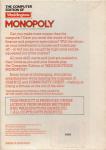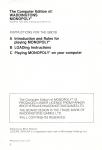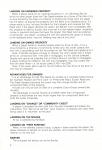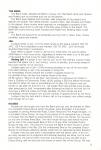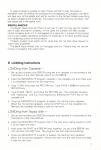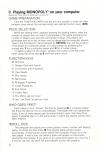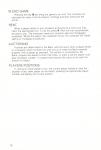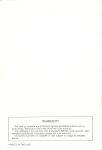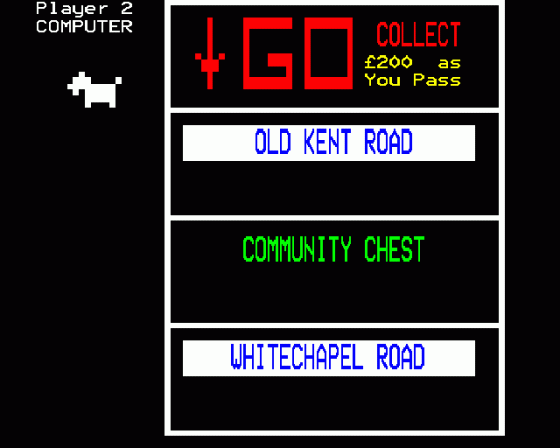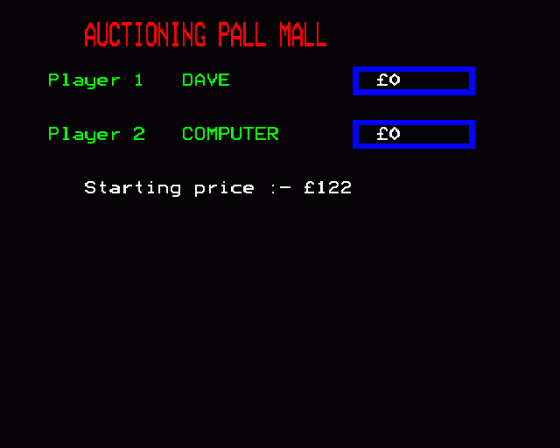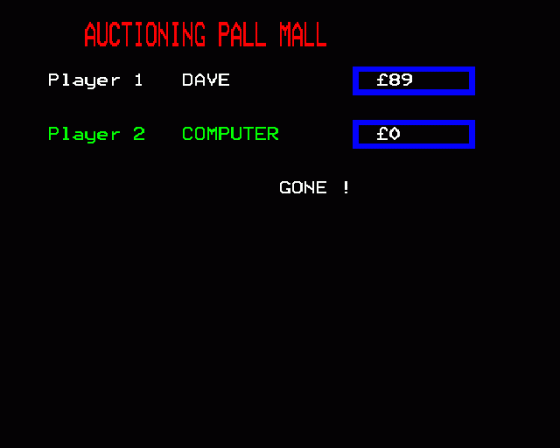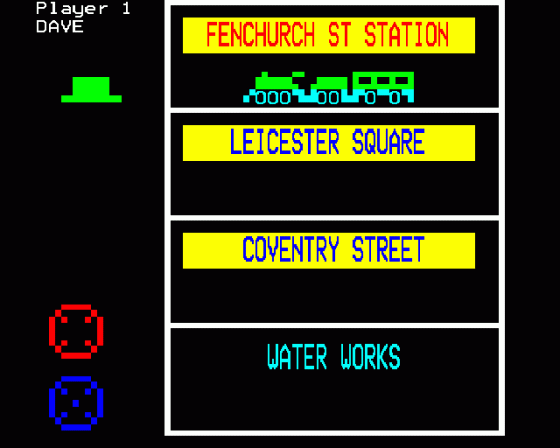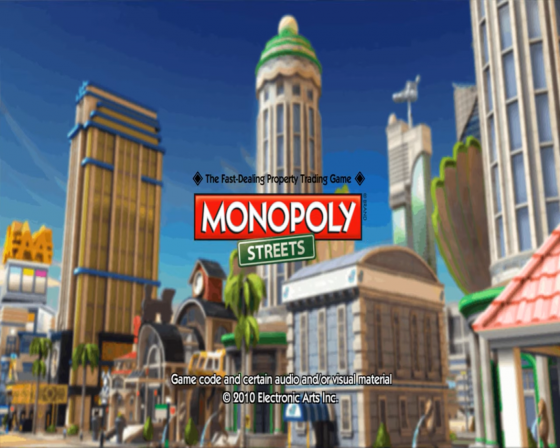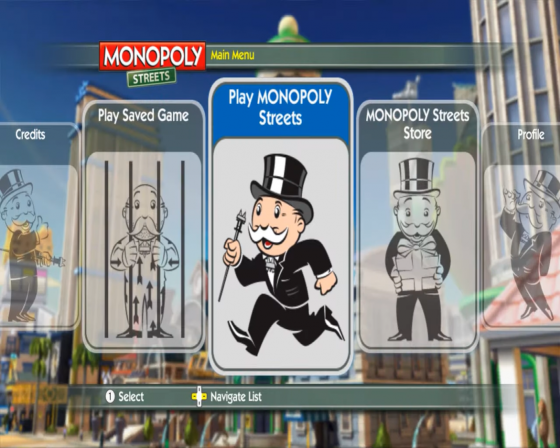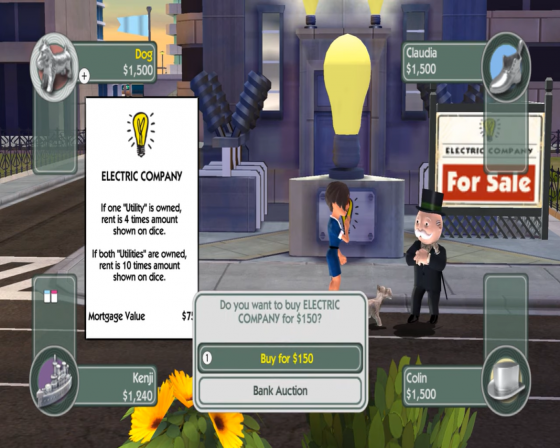Alternative Games Called Monopoly
Available for Amiga 500, BBC Model B, Game Boy Advance, Game Boy Color, PlayStation, Sega Master System, Sinclair ZX81 & Spectrum 48K
Available for Atari ST, Game Boy, Nintendo, SNES/Super Famicom, Sega Genesis
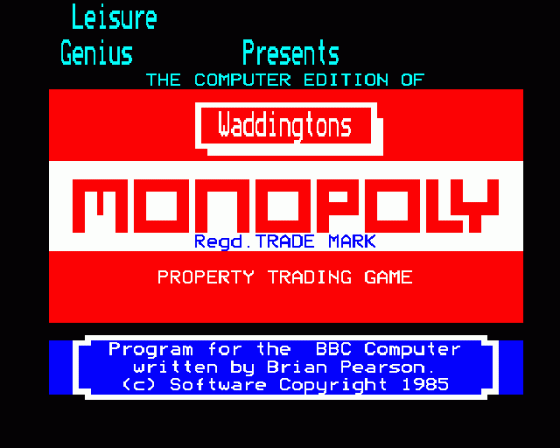
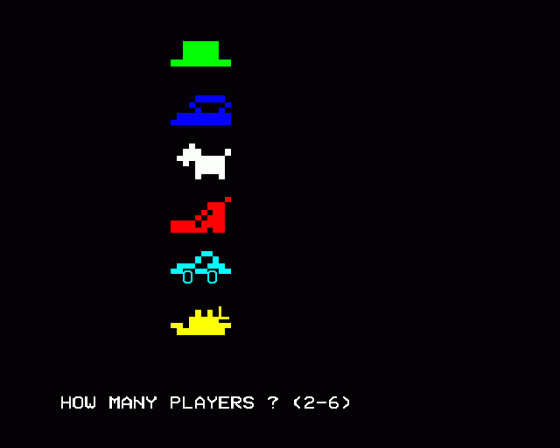

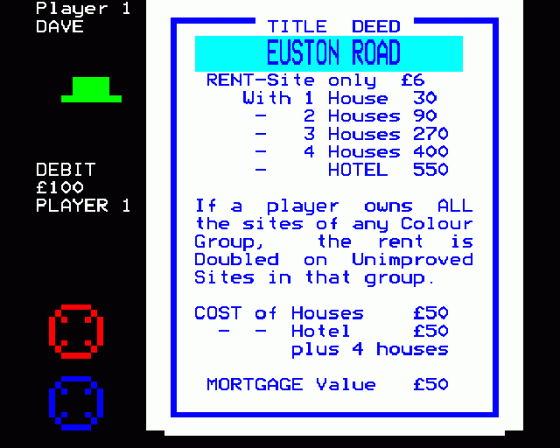

| Genre: | Game: Board |
| Publisher: | Leisure Genius |
| Cover Art Language: | English |
| Machine Compatibility: | BBC Model B |
| Release: | Professionally released on Cassette |
| Available For: | Amstrad CPC464, Atari 400/800/600XL/800XL/130XE, Atari ST, BBC Model B, Commodore 64/128, MSX & Spectrum 48K |
| Compatible Emulators: | BeebEm (PC (Windows)) PcBBC (PC (MS-DOS)) Model B Emulator (PC (Windows)) |
| Original Release Date: | 10th December 1984 |
| Original Release Price: | Unknown |
| Market Valuation: | £2.50 (How Is This Calculated?) |
| Item Weight: | 64g |
| Box Type: | Cassette Single Plastic Clear |
| Author(s): | Brian Pearson |
Variant Items
There are 2 other items featuring this same game (that we know about!). Click any of them for their details.
Active Auctions
Closed Auctions
Buy It
Unfortunately no-one is currently selling this item.
Auction Price Watch
Worried you're being ripped off? Closing prices on eBay can help you decide what a reasonable price is for a particular item.

Acorn User
1st March 1986
A good but slightly buggy transferral of the game. Read Review

The Micro User
1st April 1986
This computer edition of Monopoly is well written and even more addictive than the board game. Read Review
Full Instructions
Monopoly
Can you make more money than the computer? Dare you enter the world of high finance and property speculation? Will the return on your investments in houses and hotels pay off - or will you be caught by high rents and be squeezed out of the market?
All your skill, nerve and luck are pushed to their limits as you and your friends play the Computer Edition of Waddingtons' Monopoly.
Enjoy hours of challenging, stimulating entertainment while braving the surprises of Chance and Community Chest - making or losing a fortune on the roll of the dice!
This package contains a tape cassette of the game and an instruction booklet.
Brief Idea Of The Game
The idea of the game is to buy and rent or sell properties so profitably that players increase their wealth-the wealthiest becoming the eventual winner. Starting from "GO", move the tokens around the board according to the throw of the dice. When a player's token lands on a space not already owned, he may buy it from the Bank: otherwise it is auctioned off to the highest bidder. The object of owning property is to collect rents from opponents stopping there. Rentals are greatly increased by the erection of Houses and Hotels, so it is wise to build them on some of your Building Sites. To raise more money, Building Sites may be mortgaged to the Bank. Community Chest and Chance cards give instructions that must be followed. Sometimes players land in Jail. The game is one of shrewd and amusing trading and excitement
Equipment
Monopoly Real Estate Trading Game Equipment consists of the board on the screen with spaces indicating Building Sites, Railway Stations, Utilities, rewards and penalties over which the players' pieces are moved. There are two dice, and 6 tokens of various designs for playing pieces. Thirty-two green Houses, twelve red Hotels and two sets of cards for Chance and Community Chest spaces. There are Title Deeds for every property.
Preparation
Each player chooses one token to represent him on his travels around the board. Each player is allocated £1,500. All other equipment goes to the Bank.
To Start The Game
Each player in turn throws the dice. The player with highest total starts the play. His token is placed on the corner marked "GO", he throws the dice and moves his token in the direction of the Arrow the number of spaces indicated by the dice. After he has completed his play, the turn to play goes in the order in which names have been entered. The tokens remain on the spaces occupied and proceed from that point on the player's next turn. One or more tokens may rest on the same space at the same time.
According to the space which his token reaches, a player may be entitled to buy Building Sites or other properties-or be obliged to pay rent (if another owns the property), pay taxes, draw a Chance or a Community Chest card, "Go to Jail", etc.
If a player throws doubles his token is moved as usual, the sum of the two dice and the space thus reached is effective (i.e. the player is subject to any privileges or penalties pertaining to that space). Retaining control of the dice, he throws again and moves his token as before, and again, the space thus reached is effective. If, however, he throws three doubles in succession, he does not move his token on his third throw but immediately "goes to jail" and his turn ends. (See Jail.)
Every time that a player's token either lands on or passes over "Go", while going in the direction of the Arrow, the Banker pays him £200 "Salary".
Landing On Unowned Property
When a player lands on an unowned property (i.e. on a Building Site for which no other player holds the Title Deed) whether by a throw of the dice or by a move forced by the draw of a Chance or Community Chest card, the player has the option of buying that property from the Bank at its displayed price. If a player elects to buy, he pays the Bank for that property and receives the Title Deed card. If the player declines his option, the Banker must immediately offer this property for sale by auction and must sell it to the highest bidder, accepting money in payment and give the buyer the proper Title Deed card as evidence of ownership. Any player, including the one who declined the option of buying at the displayed price, may bid. Bidding may start at any price.
Landing On Owned Property
When a player lands on owned property either by throw of dice, or by a move forced by a Chance or Community Chest card, the owner collects rent from him in accordance with the list printed on the Title Deed card applying to it.
Note: If the Site contains a House or Houses, the rent is larger than it would be for an unimproved Site. If the Site is mortgaged, no rent can be collected. Double rent cannot be collected from a Colour-Group if one Site is mortgaged. A player holding four Stations, but with one mortgaged, may only collect rent from the other three-i.e. he would collect £100 - not £200.
Note: If the owner fails to ask for his rent before the next throw of the dice no rent may be collected.
Advantages For Owners
It is an advantage to hold Title Deeds for all Sites of a complete Colour-Group (for example: Mayfair and Park Lane-or Pentonville Road, Euston Road and The Angel Islington) because the owner may then charge double rent for unimproved Sites of that property.
Houses can only be built on Sites of a complete Colour-Group owned (see Houses).
The advantage of owning Houses and Hotels rather than unimproved property is that rentals are very much higher than for unimproved Sites and profit the owner immensely.
Landing On Chance Or Community Chest
A player is allocated the next card from the pack indicated and follows the instructions. The "Get out of Jail free" card, however, is retained until used. After being used, it is "returned" to the pack.
Landing On Tax Spaces
All tax is collected by the Bank.
Landing On Free Parking
When, in the ordinary course of play, a player's token reaches this space, the player receives no benefit nor incurs any penalty, and moves ahead in the usual manner on his next turn.
Banker
The computer will always act as the Banker.
The Bank
The Bank holds, besides the Bank's money, the Title Deed cards and Houses and Hotels prior to purchase and use by the players.
The Bank pays salaries and bonuses, sells properties to the players and delivers the proper Title Deeds therefor, auctions Sites, sells Houses and Hotels to the players, loans money when required on mortgages of property at the mortgage value which is one-half of the Site value printed on the board. The Bank will at any time buy back Houses and Hotels from Building Sites at half-price.
The Bank will account for all properties you buy from it, taxes, fines, money penalties, loans and interest.
Jail
A player lands in Jail-(1) If his token lands on the space marked "GO TO JAIL". (2) If he is allocated a card marked "GO TO JAIL". (3) If he throws doubles three times in succession.
Note: When a player is sent to Jail his turn ends there. He cannot collect £200 Salary in that move since, regardless of where his token is or of the path of the board he must move his token directly into Jail.
Visiting Jail. If a player is not "sent to Jail" but in the ordinary course of play reaches that space, he is "just visiting", incurs no penalty, and moves ahead in the usual manner on his next turn.
A player gets out of Jail-(1) By throwing doubles on any of his next three turns after landing in Jail. If he succeeds in doing this he immediately moves forward the number of spaces shown by his doubles throw; he also has another throw of the dice. (2) By using a "Get out of Jail free" card having on a previous turn drawn it from a Chance or Community Chest. (3) By paying a £50 fine before he throws the dice for either his next or succeeding turn to play. (4) A player must not remain in Jail after his third turn (i.e., not longer than having three turns to play after being sent to Jail). Immediately after throwing the dice for his third turn he must pay a £50 fine unless he throws doubles. He then comes out and immediately moves forward from Jail the number of spaces shown by his throw.
A player may buy and erect a House, sell or buy property, and collect rentals, even though he is in jail.
Houses
Houses can be bought only from the Bank and can only be erected on Sites of a complete Colour-Group which the player owns (Example: If one player succeeds in owning Pentonville Road, Euston Road and The Angel Islington, i.e. a complete Colour-Group, he may at any period of his ownership buy a House or Houses from the Bank to erect thereon). If he buys one House, he may put it on any one of these three Sites. The next House he buys and erects must be put on one of the unoccupied Sites of this or of any other complete ColourGroup he may own. The price he must pay the Bank for each House is shown on his Title Deed of the Site. (On the unimproved Sites of his complete ColourGroup he continues collecting double rental from an opponent landing thereon.)
A player may buy and erect in accordance with the above rules, in his turn, as many Houses as his judgment and financial standing will allow, but he must build evenly. He cannot erect more than one House on any one Site of any Colour-Group until he has built one House on every Site of that Group. He may then begin on the second row of Houses and so on up to a limit of four Houses to a Site. He cannot build, for example, three Houses on one Site if he has only one House on another Site of that Group. Similarly, Sites must be maintained evenly-i.e. if Houses have to be sold they must be removed equally from Sites of a Colour-Group. Houses may not be built on Sites if one of the same ColourGroup is mortgaged.
Hotels
A player must have four Houses on each Site of a complete Colour-Group before he can buy an Hotel. He may then buy an Hotel from the Bank to be erected on any Site of that Colour-Group, delivering to the Bank in payment, the four Houses already on the Site plus the additional cost of the Hotel (£200 for an Hotel on Park Lane or Mayfair) shown on the Title Deed. (It is very desirable to erect Hotels on account of the very large rental which may be charged. Only one Hotel may be erected on any one Site.)
Building Shortage
When the Bank has no Houses to sell, players wishing to build must wait for some player to return or to sell his Houses to the Bank before they can build.
Selling Property
Undeveloped Sites, Railway Stations and Utilities (but not buildings thereon) may be sold to any player as a private transaction for any amount that the owner can get. No Site, however, can be sold to another player if buildings are standing on any Sites of that Colour-Group. Any buildings so situated must be sold back to the Bank before the owner can sell any Site of that Colour-Group. Mortgaged property cannot be sold to the Bank-only to other players.
Houses and Hotels may be resold by players to the Bank only, but this may be done at any time and the Bank will pay one half of the price paid for them. In the case of Hotels, the Bank will pay half the cash price of the Hotel plus half the price of the four Houses which were given in the purchase of the Hotel.
Mortgages
Mortgaging properties can be done through the Bank only. The mortgage value is shown on each Title Deed. The rate of interest is 10 per cent, payable when the mortgage is lifted.
Houses or Hotels cannot be mortgaged. All buildings on the Site must be sold back to the Bank before any property can be mortgaged. The Bank will pay one half of what was paid for them.
In order to rebuild a House on mortgaged property the owner must pay the Bank the amount of the mortgage, plus the 10 per cent interest charge and buy the House back from the Bank at its full price.
Bankruptcy
A player who is bankrupt, that is, one who owes more than he can pay, must turn over to his creditor all that he has of value, and retire from the game. In making this settlement, however, if he owns Houses or Hotels, these are returned to the Bank in exchange for money, to the extent of half their cost as shown on the Title Deeds, and this cash is given to the creditor.
In case a player is unable to raise money enough to pay his taxes or penalties, even by selling his buildings and mortgaging his property, the Bank. will take over all his assets and sell by auction to the highest bidder everything so taken excepting the buildings. The player must then remove his token. The last player left in the game wins.
Miscellaneous
If a player owes more rent than he can pay in cash he may pay his creditor part in cash and part in property. In this case, the creditor will often accept certain property (even if it is mortgaged) at a value far in excess of the printed one so as to obtain additional property for buildings or to block another player from obtaining control of that property.
Property owners must watch out for rents due. Do not help other players to watch their properties.
The Bank loans money only on mortgage security. Players may not borrow money or property from each other.
Game Preparation
Take the function card from the box and position it under the clear perspex cover above the corresponding user-defined function keys (f0-f9).
Price Selection
When the starting menu appears, showing the playing tokens, enter the number of players that you want to participate in the game (including the number of players you want the computer to play). 2-6 players can participate and all or any of them may be designated as computer players. Type in the first player's name followed by RETURN, then tell the program if this player is a computer player or human player by answering the prompt with Y for a computer player and N for a human player.
To select a token for this player, position the pointer to the left of the token using the arrow keys and then press RETURN.
Function Keys
f0. Roll Dice
f1. Display Cash and Assets
f2. List Owners and Properties
f3. View Deeds
f4. Buy House
f5. Sell House
f6. Mortgage Procedure
f7. Trade Procedure
f9. End Game
R. Collect Rent
A. Pay £50 to get out of jail
B. Use Jail Card to get out of jail
Who Goes First?
Each player in turn "throws" the dice by pressing f0. A computer player will throw the dice on its turn automatically. The player with the highest-total starts. If two or more players get the same highest value, then they throw again. Thereafter play is in the same order in which the players names have been entered.
f0. Roll Dice
The computer will display the current player's name, number and playing piece. To throw the dice, press f0. The players piece will be moved accordingly. A short pause occurs before the computer moves on to the next player. If rent is due, the owner's token will appear on screen during the short pause. If you land on an unowned properly, you may buy it. If you do not buy, the bank will automatically auction the property.
f1. Cash And Assets
If the key f1 is held down, the current player's CASH and ASSETS will be shown on the screen.
f2. Owners And Properties
On pressing f2 all properties are listed. The player who owns a particular property will have his number displayed on the left-hand side of the property name.
If a property is mortgaged, it is displayed with red characters on a black background.
f3. View Deeds
By pressing f3, the current player may view his individual portfolio. To examine a single deed, type the property no. and press RETURN.
f4. Buy Houses
Houses and Hotels may be bought at the start of each player's turn.
Buying houses must be done one at a time by entering the number of the property (followed by RETURN) on which you want to erect a house or hotel. Press RETURN or a function key to EXIT.
f5. Sell Houses
Houses and Hotels may be sold using the same method as buying a house. If a Hotel is sold and there are insufficient houses in the bank to replace the hotel, the player will be given all houses available plus the cash adjustment.
f6. Mortgage Properties
To mortgage or unmortgage a property, press key f6. Enter the property number desired followed by RETURN and the deed will be shown.
If a property is mortgaged the deed will be viewed as white text on red. If a property is unmortgaged the deed will be viewed as blue text on white.
f7. Trade Procedure
Pressing the key f7 enables the current player to buy, sell or exchange properties with another player. Pressing the key f7 during the trade procedure allows the current player to switch the display from the list of property numbers to the list of owners and back at will.
The program first prompts for the other player's number-enter the number followed by RETURN. The current player may then enter up to 3 properties which are being offered by typing their numbers followed by RETURN. If no further properties are being offered, RETURN by itself moves the program onto the next stage.
In the same way, the program prompts for up to 3 exchange properties belonging to the other player.
The program then asks if there is a cash adjustment, and, if so, the amount and to which player it is to be paid. Finally, the other player is given the chance to accept or reject the trade.
f9. End Game
Pressing the key f9 will bring the game to an end. The computer wil calculate the value of all the players' holdings and then announce the winner.
Rent
When a player lands on your property at the end of a move you may claim the appropriate rent. To do this press R Rent will then automatically be paid to you. The computer checks for property sets and mortgaged properties. Where the player has insufficient funds, the computer will initiate selling or mortgage procedures.
Auctioning
Auctions are determined by the Bank, and will occur when a player lands on a property which he does not wish to buy or when the Bank receives property from a player as payment. The auction is conducted by the Bank-players are asked to enter their bids-to enter a bid the player must type his player number. If a player bids beyond the value of his cash the auction is voided.
Players Positions
If, during a human player's turn, the current player wishes to view the position of any other player on the board, pressing the appropriate player number will display the current position.
Loading
Tape: CHAIN"" (RETURN)
Disc: SHIFT-BREAK
Miscellaneous
This game was mentioned in the following articles:
Screen Designers
The following utilities are also available to allow you to edit the supplied screens of this game:
Cheats
Download
A digital version of this item can be downloaded right here at Everygamegoing (All our downloads are in .zip format).
| Download | What It Contains |
|---|---|
| A digital version of Monopoly suitable for BeebEm (PC (Windows)), PcBBC (PC (MS-DOS)), Model B Emulator (PC (Windows)) |
Games Like Monopoly
Report A Problem
We thank you from the bottom of our hearts if you report something wrong on our site. It's the only way we can fix any problems!
You are not currently logged in so your report will be anonymous.
Add Note
Release Country
Change the country to update it. Click outside of this pop-up to cancel.
Scan Of Selected Article
If you auction an item, it will no longer show in the regular shop section of the site.








